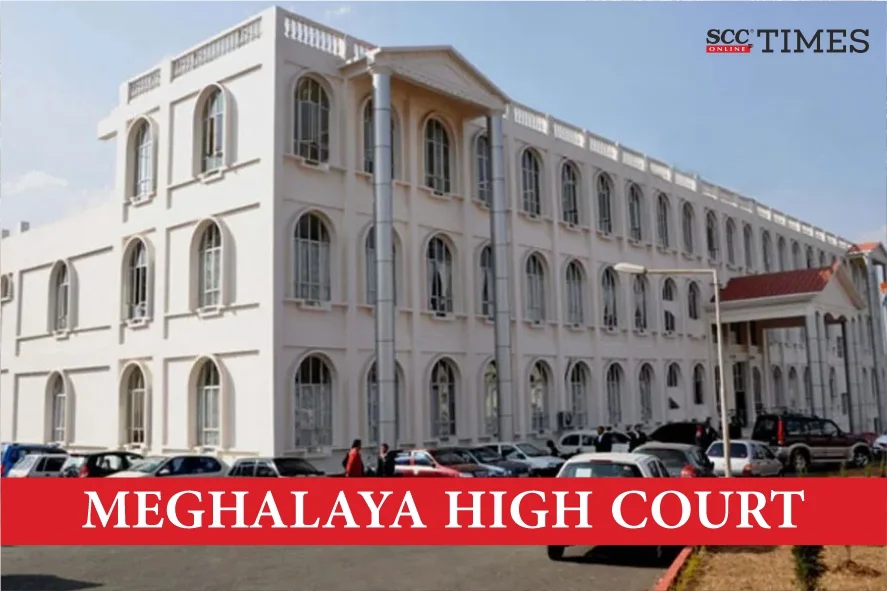Meghalaya High Court: In a criminal appeal under Section 374(2) of the Code of Criminal Procedure, 1973 (‘CrPC’) against an order of the Special Judge under the Protection of Children from Sexual Offences Act, 2012 (‘POCSO Act’) where the accused was convicted for seven years of rigorous imprisonment. B. Bhattacharjee, J. allowed the criminal appeal, quashing the judgment and order of the Special Judge saying that no person can be punished despite strong suspicion unless legal proof is adduced.
The convict wascharged with Section 5(m)/6 of the POCSO Act for the sexual assault of a minor boy. The Special Court convicted the accused based on deposition of the mother, the statement of the survivor child recorded under Section 164 and Section 161 of the CrPC, medical evidence by the medical expert under Section 45 of the Evidence Act, 1872 and statement made by the convict under Section 313 of the CrPC. The Special Court also drew assistance of presumption under Section 29 of the POCSO Act.
The Court held that the Special Court referred to the statement made by the survivor child under Section 161 of the CrPC before the investigating authority to record reasons for its findings, however, Section 162 of the CrPC puts a clear embargo on the admissibility of the statement made by any person to a police officer in the course of investigation. The Court also cited Parvat Singh v. State of M.P., (2020) 4 SCC 33 which states that statement under Section 161 of the CrPC can only be used to prove the contradictions and/or omissions, however, it cannot be used to justify reasons while recording its finding in a criminal trial.
The Court reiterated that the statement under Section 161 of the CrPC may be used only at the stage of recording evidence in a trial in accordance with the proviso attached to Section 162(1) of the CrPC. The Court said that in the instant case, none of the prosecution witnesses was ever confronted with their statement recorded under Section 161 of the CrPC at the time of recording of evidence by the Special Court and hence, the use of the statement of the survivor made before the investigating officer by the Special Court is against the settled proposition of law.
The Bench clarified that the Special Court’s reliance upon the statement of the survivor child recorded under Section 164 of the CrPC corroborating it with medical evidence is not substantive evidence and that a statement under Section 164 of the CrPC can be utilized only to corroborate or contradict the witness vis-à-vis statement made in Court. The Bench relied upon two Apex Court judgements, Ram Kishan Singh v. Harmit Kaur and another, (1972) 3 SCC 280 and BaijNath Sah v State of Bihar, (2010) 6 SCC 736 to reiterate the same. The Court also said that even though the evidence of medical expert is relevant under Section 45 of the Indian Evidence Act, 1872, it cannot take the place of substantive evidence as it is not direct evidence and is only of corroborative value.The Court said that since the statements under Section 164 CrPC was not substantive evidence, the Special Court was misled in placing reliance on it by drawing corroboration from medical evidence.
Further, the Court discussed the presumption under Section 29 of the POCSO Act, and said that to raise the same, it is essential on the part of the Prosecution to establish foundational facts on the basis of admissible and substantial evidence. The Court explained that the presumption under Section 29 of the POCSO Act will become operational only when the necessary foundational facts are established by the prosecution by leading legally tenable evidence and in the matter at hand, there was no direct evidence of survivor’s suffering from bleeding and pain. The Court added that there was nothing in the evidence to show that the survivor child’s mother noticed any discomfort in the physical appearance or movement of the survivor child. Therefore, the Court said that it was grossly improper for the Special Court to convict on the basis of corroborating evidence drawn from the statement of the survivor child under Section 161 of the CrPC and 164 and the medical evidence.
The Court questioned the manner in which the statement of the convictwas recorded under Section 313 of the CrPC. The Court said that the object of Section 313 of the CrPC is to afford a fair and proper opportunity to the convict for explaining circumstances appearing against him and that the procedure adopted by the Special Court must be such that even an illiterate person will be able to appreciate and understand. In the instant matter, the Court said that there was discrepancy as to on which date the statement of the convict was recorded under Section 313 of the CrPC as copies of the evidence including the statement under Section 313 of the CrPC was received by the Counsels for the rival parties before the date on which the alleged statement and thumbprint of the convict was taken. The Court also added that the fact that the convict is an illiterate person, the Special Court was required to take a careful and attentive approach at the time of recording of the statement. The Bench said that the lack of proper application of the procedure of law renders the entire statement of the convict defective and perfunctory.
Therefore, the Bench held that in the absence of legal proof of the convictconvict committing the offence, the Court must give benefit of doubt to the convict. The Court convictallowed the appeal, quashed the impugned judgment and set aside the Order of Sentence as well.
[Amit Boro v. State of Meghalaya, 2024 SCC OnLine Megh 134, Order dated 08-03-2024]









